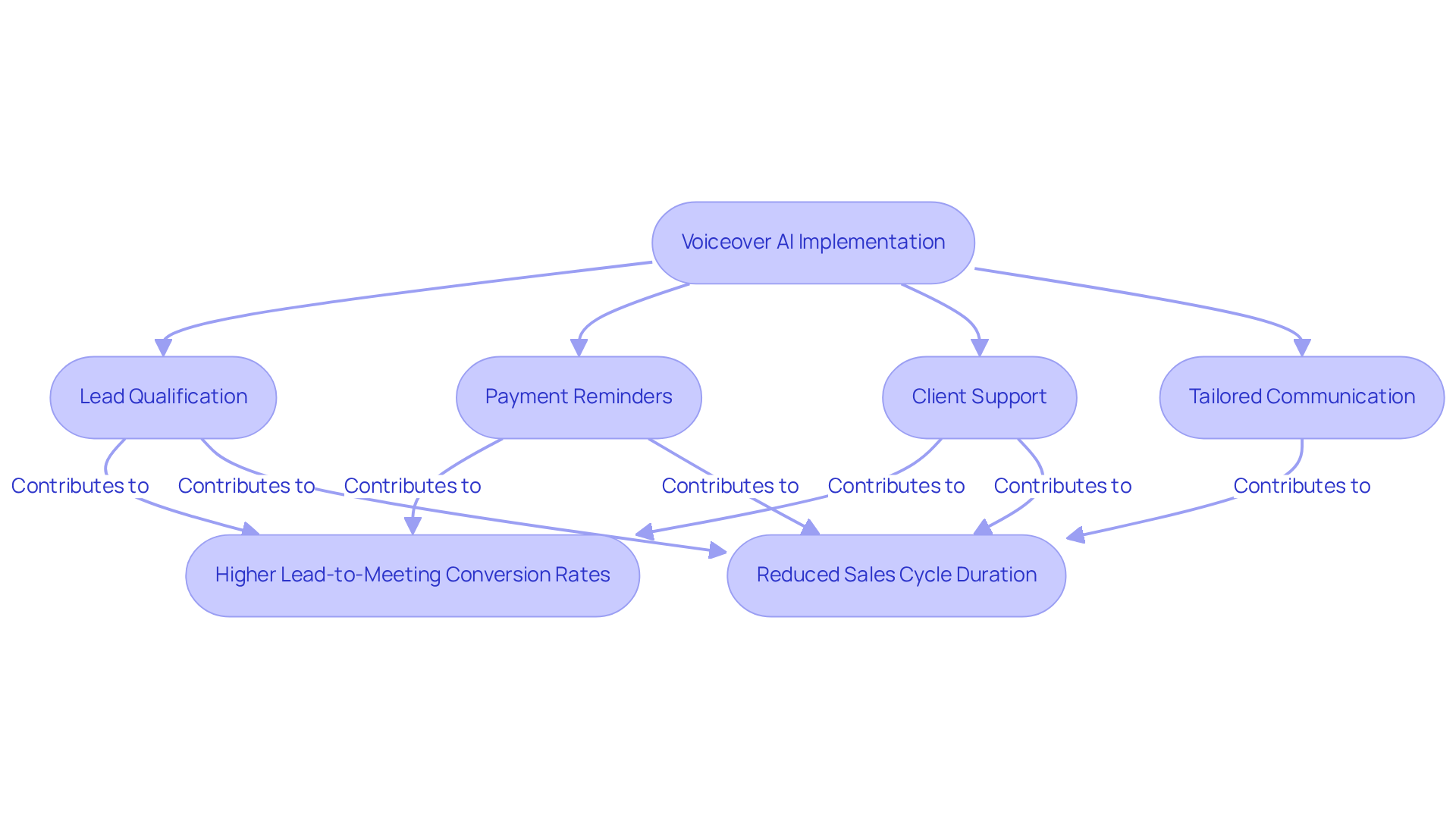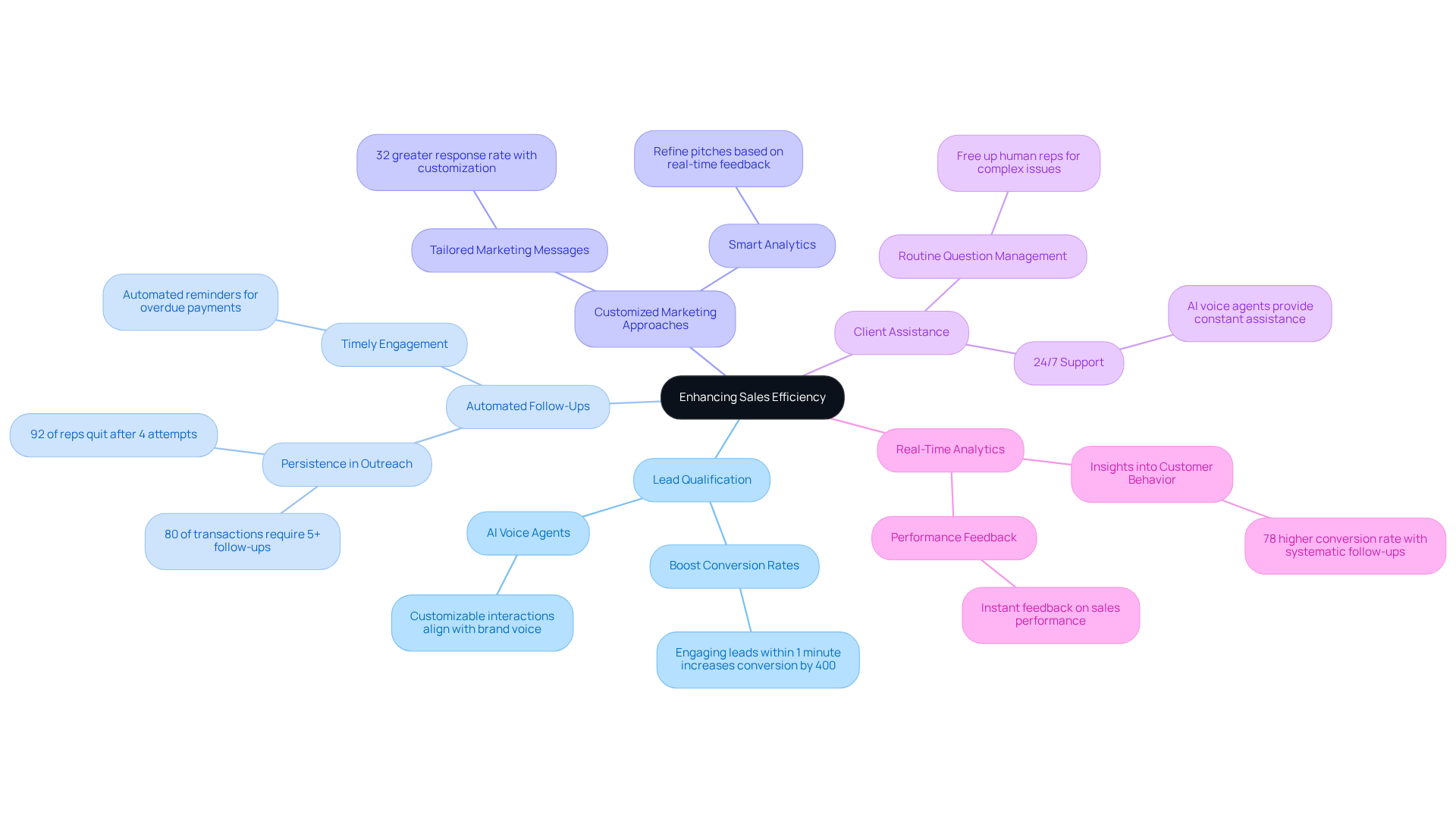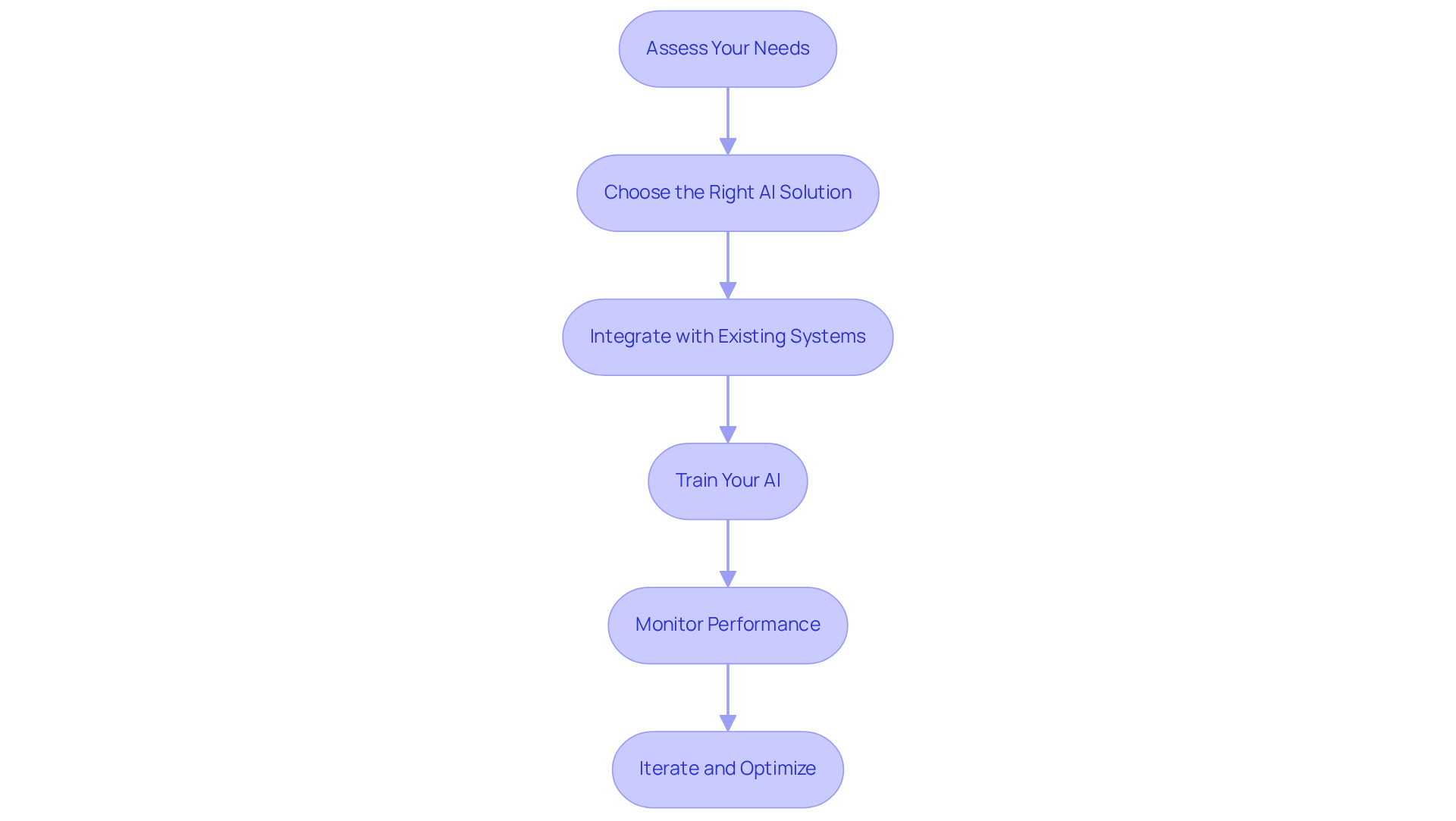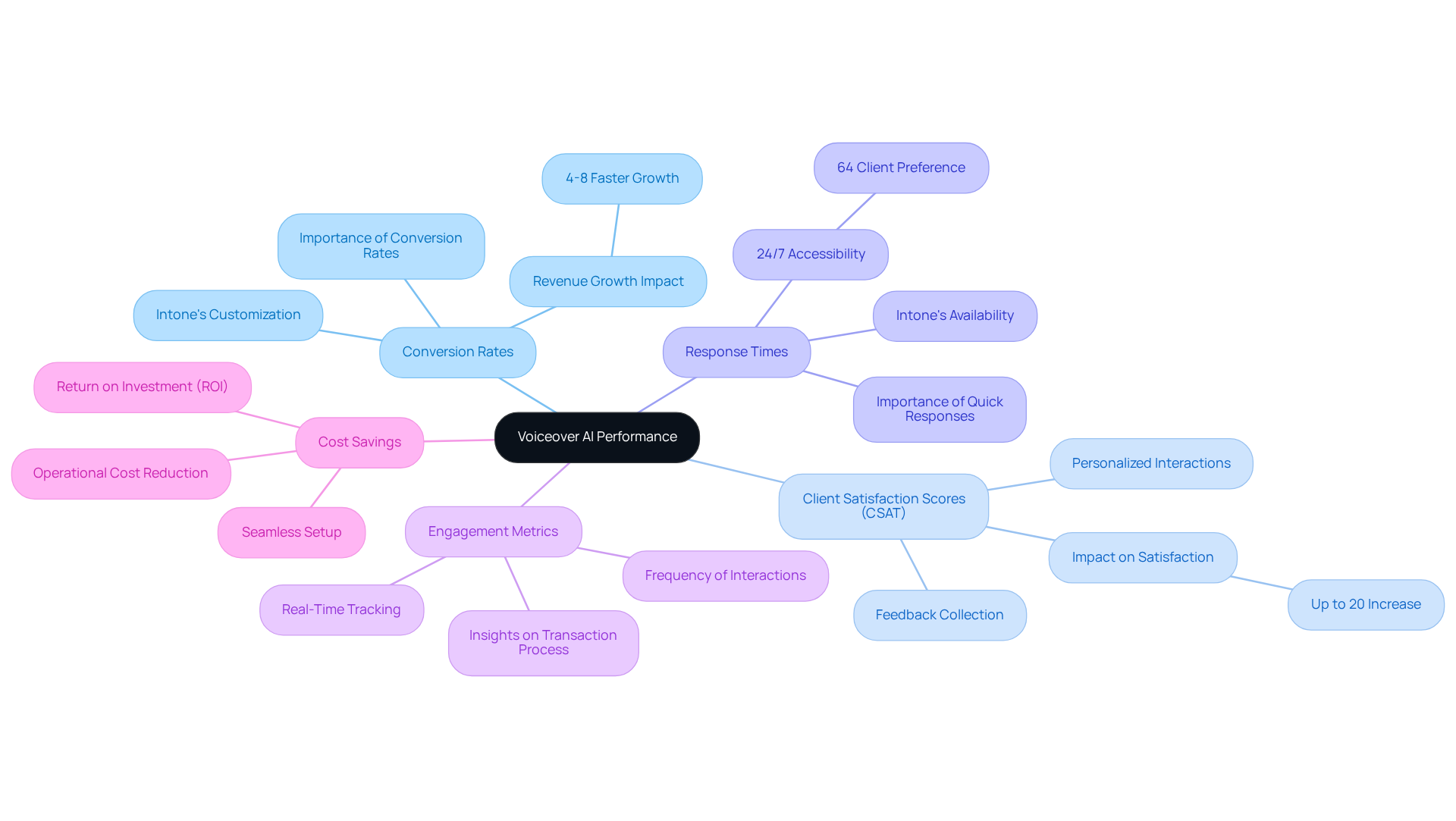Overview
The article examines how businesses can optimize sales efficiency by adopting voiceover AI best practices. It engages the reader by detailing various applications of voiceover AI, including:
- Lead qualification
- Automated follow-ups
- Real-time analytics
These elements work together to enhance conversion rates and streamline sales processes. Ultimately, this leads to improved operational efficiency and increased client satisfaction.
Introduction
The rise of voiceover AI is revolutionizing the sales landscape, providing businesses with a formidable tool to streamline processes and elevate customer interactions. By leveraging this technology, organizations can automate lead qualification, follow-ups, and personalized marketing strategies, ultimately driving higher conversion rates and enhancing client satisfaction. Yet, as companies eagerly adopt these advanced solutions, a pivotal question emerges: how can they effectively implement voiceover AI to maximize its potential and ensure alignment with their sales objectives?
Understand Voiceover AI and Its Role in Sales
Narration AI signifies a groundbreaking advancement in artificial intelligence, meticulously crafted to emulate human-like conversations and automate critical sales functions. These AI agents excel in lead qualification, payment reminders, and client support, effectively reducing the workload on human agents.
By leveraging sophisticated machine learning algorithms, voiceover AI can analyze client interactions, promptly identify high-intent leads, and engage individuals with tailored communication. This capability holds particular significance in the finance sector, where timely communication and streamlined processes are essential for optimizing conversion rates and enhancing client satisfaction.
Organizations utilizing AI voice agents have reported as much as 40% higher lead-to-meeting conversion rates and a 30% decrease in the sales cycle duration. The integration of AI for voice applications not only refines sales processes but also equips companies to meet the evolving demands of clients in 2025 and beyond.
Understanding the full potential of AI for audio narration is imperative for effectively integrating it into your marketing strategy.

Leverage Voiceover AI to Enhance Sales Efficiency
To enhance sales efficiency, businesses should concentrate on the following applications of Voiceover AI:
-
Lead Qualification: AI systems swiftly evaluate lead intent through initial conversations, enabling sales teams to prioritize high-potential prospects. Engaging leads within the first minute of inquiry can boost conversion rates by nearly 400%, underscoring the significance of timely qualification. Intone's AI voice agents facilitate customizable interactions, ensuring that each conversation aligns with your brand's voice and fosters trust with potential clients.
-
Automated Follow-Ups: Voiceover AI effectively sends reminders for overdue payments or follows up on leads that have gone cold, ensuring that no opportunity is overlooked. Research indicates that 80% of transactions necessitate five or more follow-ups, yet 92% of representatives abandon efforts after only four attempts. Automated follow-ups significantly enhance persistence in outreach, ensuring timely and relevant engagement through Intone's voiceover AI messaging capabilities.
-
Customized Marketing Approaches: By analyzing customer information, AI can tailor marketing messages to personal preferences, thereby enhancing the likelihood of conversion. Tailored outreach has demonstrated a 32% greater response rate compared to generic methods, establishing customization as a crucial tactic in commerce. Intone's smart analytics empower sales teams to refine their pitches based on real-time feedback, ensuring that each interaction is optimized for success.
-
Client Assistance: AI representatives effectively manage routine questions, allowing human representatives to focus on more intricate matters, thereby enhancing overall user satisfaction. This shift not only improves service quality but also enables a more strategic allocation of human resources. With Intone's AI voice agents, businesses can provide 24/7 support, ensuring that client needs are met around the clock.
-
Real-Time Analytics: By leveraging AI's analytical capabilities, companies can gain insights into customer behavior and performance, facilitating data-informed decision-making. Companies that implement systematic follow-up processes experience a 78% higher conversion rate, highlighting the value of informed strategies. Intone's analytics dashboard delivers instant feedback on performance, enabling teams to react swiftly and maintain a competitive edge.
By utilizing these applications, companies can optimize their revenue processes, reduce operational expenses, and ultimately increase conversion rates.

Implement Voiceover AI: Step-by-Step Guide
Implementing voiceover AI involves several key steps that can transform your sales process.
-
Assess Your Needs: Begin by identifying specific areas within your sales process that could benefit from automation. Consider critical factors such as lead volume, customer interaction frequency, and existing pain points.
-
Choose the Right AI Solution: Conduct thorough research to select a voiceover AI solution that aligns with your business needs. Prioritize features such as customization options, integration capabilities, and analytics tools that can enhance your operations.
-
Integrate with Existing Systems: It is essential to ensure that the existing systems can seamlessly integrate with your current CRM and telephony systems using Voiceover AI. This integration is vital to avoid disruptions in workflow and maintain efficiency.
-
Train Your AI: Provide the AI with relevant data and scenarios to improve its performance. This training may involve supplying historical transaction information and frequent client inquiries to enhance its responsiveness.
-
Monitor Performance: Post-implementation, continuously monitor the AI's performance through analytics. Assess key metrics such as conversion rates, customer satisfaction scores, and response times to identify areas for improvement.
-
Iterate and Optimize: Utilize the insights gained from monitoring to refine the AI's capabilities. Frequent updates and training are crucial to ensure that the AI remains efficient and aligned with your business objectives.
By following these steps, businesses can successfully implement voiceover AI, significantly enhancing their sales efficiency.

Measure and Optimize Voiceover AI Performance
To effectively measure and optimize the performance of Voiceover AI, businesses must concentrate on several key metrics:
-
Conversion Rates: Monitoring the percentage of leads transformed into clients is crucial for evaluating the effectiveness of AI-driven interactions. This metric is essential; companies excelling in client experience witness revenue growth rates of 4% to 8% faster than their competitors. Intone's customizable AI voice agents significantly enhance conversion rates by personalizing interactions to meet specific user needs.
-
Client Satisfaction Scores (CSAT): Gathering feedback from clients regarding their interactions with the AI is vital. A positive experience with AI support software can elevate client satisfaction by up to 20%, underscoring the importance of this metric in pinpointing areas for enhancement. Intone's agents are crafted to deliver personalized interactions, further boosting CSAT scores.
-
Response Times: It is imperative to monitor how swiftly the AI responds to client inquiries. Studies indicate that 64% of clients regard 24/7 accessibility as the top chatbot attribute, and quicker response times can significantly enhance satisfaction and conversion rates. Intone's AI agents are available around the clock, ensuring that inquiries are addressed promptly.
-
Engagement Metrics: Analyzing the frequency and nature of customer interactions with the AI provides valuable insights. Understanding engagement trends can illuminate the AI's impact on the transaction process and assist in refining its capabilities. Intone's smart analytics empower businesses to track these metrics in real-time, facilitating continuous improvement.
-
Cost Savings: Assessing the reduction in operational costs due to the automation of sales functions illustrates the return on investment (ROI) associated with implementing AI for voiceovers. Intone's seamless setup and customization process allows businesses to quickly realize these cost savings without extensive upfront investment.
Furthermore, it is noteworthy that 80% of service organizations will implement generative AI by 2025, highlighting the growing trend of AI adoption in service sectors. Once these metrics are established, businesses should routinely review performance data and make necessary adjustments to the AI's programming and strategies. Continuous optimization is essential to ensure that voiceover AI remains effective and aligned with evolving business objectives, ultimately leading to sustained sales efficiency. As evidenced in the case study on GCS's success with Intone's AI agents, AI enhances customer satisfaction through streamlined processes and personalized interactions, establishing it as a strategic imperative for businesses.

Conclusion
Voiceover AI stands as a transformative force in sales, empowering businesses to streamline processes, enhance client interactions, and significantly boost conversion rates. By adopting voiceover AI, organizations can automate essential functions such as lead qualification, follow-ups, and customer support, enabling human agents to focus on more complex tasks. This strategic integration not only optimizes sales efficiency but also aligns with the evolving demands of clients in a competitive marketplace.
The multifaceted benefits of voiceover AI are compelling, including:
- Improved lead qualification
- Automated follow-ups
- Personalized marketing approaches
The implementation process necessitates a thorough assessment of specific needs, the selection of the appropriate AI solution, and the continuous monitoring of performance metrics such as conversion rates and client satisfaction scores. These insights highlight the necessity of a structured approach to fully harness the potential of AI in sales.
Embracing voiceover AI is not merely a trend; it is a strategic necessity for businesses aiming to thrive in an increasingly digital landscape. As organizations prepare for the future, investing in AI-driven solutions can yield substantial operational efficiencies and enhanced customer experiences. The time to act is now—leverage voiceover AI to redefine sales strategies and achieve sustainable growth.
Frequently Asked Questions
What is Voiceover AI?
Voiceover AI, or narration AI, is an advanced form of artificial intelligence designed to mimic human-like conversations and automate essential sales functions.
What functions can Voiceover AI automate in sales?
Voiceover AI can automate lead qualification, payment reminders, and client support, significantly reducing the workload for human agents.
How does Voiceover AI enhance client interactions?
It leverages sophisticated machine learning algorithms to analyze client interactions, identify high-intent leads, and engage them with personalized communication.
Why is Voiceover AI particularly important in the finance sector?
In the finance sector, timely communication and streamlined processes are critical for optimizing conversion rates and enhancing client satisfaction.
What improvements have organizations seen by using AI voice agents?
Organizations using AI voice agents have reported up to 40% higher lead-to-meeting conversion rates and a 30% reduction in the sales cycle duration.
How does integrating AI for voice applications benefit companies?
Integrating AI for voice applications refines sales processes and helps companies meet the evolving demands of clients in 2025 and beyond.
Why is it important to understand the potential of AI for audio narration?
Understanding the full potential of AI for audio narration is crucial for effectively incorporating it into a marketing strategy.






